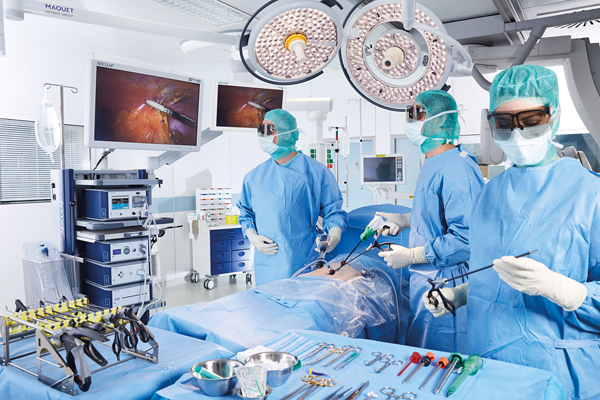Laparoscopy in Lebanon
Search and Compare the Best Clinics and Doctors at the Lowest Prices for Laparoscopy in Lebanon

Find the best clinics for Laparoscopy in Lebanon
With Medijump you can browse 1 facilities offering Laparoscopy procedures in Lebanon. The cheapest price available is $2,000 in Beirut. And for the cheapest price globally, prices start from $586 in Germany.
Laparoscopy in Beirut
Price: $ 2,000
Germany offers the best prices Worldwide
Price: $ 586
From 4 verified reviews
Joesph Sfeir, 23 November 2020
Dr Fouad Khoury saved my father's life. I cannot thank him enough for his great work and dedication. My father's case was very risky and critical, Dr Fouad took over the case after being operated three times without success at other centers. This is not to mention that he is not materialistic at all, unlike a lot of doctors that we visited.He is very committed and eager to assume full responsibility no matter how complex the case is. My father is proud for being his patient.
- Home
- Lebanon
WHY US?
At Medijump, we're making medical easy. You can search, compare, discuss, and book your medical all in one place. We open the door to the best medical providers worldwide, saving you time and energy along the way, and it's all for FREE, no hidden fees, and no price markups guaranteed. So what are you waiting for?

Free

Best Price

Widest Selection

Risk-Free
What you need to know about Laparoscopy in Lebanon

Laparoscopy is a type of surgery that allows surgeons to access the inside of the abdomen and pelvis with only small incisions. Also known as minimally invasive or keyhole surgery, laparoscopy is less painful than traditional open surgery. Other benefits of this type of surgery include less bleeding, reduced scarring, and a faster recovery period.
What does a Laparoscopy Procedure Involve?
Laparoscopy is performed under general anesthetic. During the surgery, your surgeon makes small incisions in your abdomen to insert an instrument called a laparoscope, small surgical tools, as well as a tube to pump gas into the abdomen. A laparoscope is a small tube with a camera and a light attached to its end and the camera sends images of the inside of the abdomen to a monitor.
How Long Should I Stay in Lebanon for a Laparoscopy Procedure?
You may be able to go back to your hotel immediately after a laparoscopy, but in some cases, you may need to stay for at least 1 to 2 days. You may be able to fly back home within 3 to 7 days after the surgery. During your stay, you will have to attend hospital check-ups and to rest.
What's the Recovery Time for Laparoscopy Procedures in Lebanon?
The recovery period for laparoscopic surgery depends on the type of treatment. However, the overall recovery period is shorter than the traditional surgery. For example, the total recovery period for intestinal surgery with traditional methods may take 4 to 8 weeks, but with laparoscopic surgery, you only need 2 to 3 weeks to recover and return to work.
What sort of Aftercare is Required for Laparoscopy Procedures in Lebanon?
The aftercare will be different from one person to another, depending on what type of condition the surgery is used for. Your surgeon will tell you how to keep your wounds clean, the diet you will need to follow, and the type of exercise you can do. You will likely have a follow-up check-up with your local doctor to monitor your condition.
What's the Success Rate of Laparoscopy Procedures in Lebanon?
Laparoscopy is known to have a high success rate. Serious side effects, risks, and complications are rare. Minor complications occur in 1 out of every 100 cases, while serious complications occur in 1 out of every 1,000 cases. The side effects and risks include infection, minor bleeding, damage to an organ, or damage to a major artery.
Are there Alternatives to Laparoscopy Procedures in Lebanon?
Laparoscopic surgery is an alternative to traditional open surgery. You can always undergo open surgery if you prefer to do so. There are also some treatment alternatives to laparoscopic surgery, but this depends on the condition you want to treat.
What Should You Expect Before and After the Procedure
Before a laparoscopy, you may have problems in your appendix, kidney, or other parts of your abdomen. After the surgery, these issues are treated and possibly resolved.
Whilst the information presented here has been accurately sourced and verified by a medical professional for its accuracy, it is still advised to consult with your doctor before pursuing a medical treatment at one of the listed medical providers
No Time?
Tell us what you're looking for and we'll reachout to the top clinics all at once
Enquire Now

Popular Procedures in Lebanon
Prices Start From $520

Recommended Medical Centers in Lebanon for Laparoscopy

- Interpreter services
- Translation service
- Religious facilities
- Medical records transfer
- Medical travel insurance
- Health insurance coordination
- TV in the room
- Safe in the room
- Phone in the room
- Private rooms for patients available

- Interpreter services
- Translation service
- Religious facilities
- Medical records transfer
- Medical travel insurance
- Health insurance coordination
- TV in the room
- Safe in the room
- Phone in the room
- Private rooms for patients available

- Interpreter services
- Translation service
- Religious facilities
- Medical records transfer
- Medical travel insurance
- Health insurance coordination
- TV in the room
- Safe in the room
- Phone in the room
- Private rooms for patients available

- Interpreter services
- Translation service
- Religious facilities
- Medical records transfer
- Medical travel insurance
- Health insurance coordination
- TV in the room
- Safe in the room
- Phone in the room
- Private rooms for patients available

- Interpreter services
- Translation service
- Religious facilities
- Medical records transfer
- Medical travel insurance
- Health insurance coordination
- TV in the room
- Safe in the room
- Phone in the room
- Private rooms for patients available
Laparoscopy in and around Lebanon
Lebanon, a country on the eastern shore of the Mediterranean Sea, is one of the smallest sovereign states. The country boasts a fascinating mixture of the Middle East and the West, Christianity, and Islam, and tradition and modernity. It has everything from golden beaches and World Heritage Sites to energetic nightlife and delicious cuisine. Among other countries in the Middle East, Lebanon appears to be one of the most popular medical tourism destinations. Over 10% of the tourists visiting the country, particularly from neighboring countries, come to receive medical care. Many hospitals and clinics in the country are accredited to the ISO:9000 standard and offer world-class specialist services in spine treatment, orthopedics, organ transplant, and other complex surgeries, as well as advanced cancer treatments. Cosmetic and reconstructive surgery are also popular.
Popular Parts of Lebanon
Beirut, the capital and largest city of Lebanon, is filled with historic landmarks and natural wonders. The most famous attractions in the city are the National Museum of Beirut, the Corniche and Pigeon Rocks, Sursock Museum, and Mohammed Al Amin Mosque. Many people also come to Lebanon to visit the port town of Sidon. Once a rich and thriving Phoenician city, it is dotted with historical monuments and ancient remnants, particularly in its Old City. Other popular cities include Tripoly, Baalbek, Byblos, and Tyre.
Weather and Climate in Lebanon
Lebanon has four seasons: winter (December to March), spring (April to May), summer (June to September), and autumn (October to November). Winter is the rainy season with high precipitation levels and cool temperatures. It is snowy in the mountains, but in some places, such as Beirut, it just rains during this season. Summer is hot, sunny, and dry, and can get very humid in cities located close to the sea. In the summer, the average temperatures are around 28°C to 30°C. Spring and autumn are both warm and pleasant.
Getting around in Lebanon
The main international airport where visitors fly into and out of Lebanon is Beirut–Rafic Hariri International Airport, which is the only operational commercial airport in the country. It serves international flights to numerous major cities across Europe and the Middle East, including Moscow, Paris, London, and Dubai. Given the small size of the country, there are no internal flights. Intercity buses and minibus are available and have an extensive network, especially in coastal areas. The best way to get around the country is by hiring a car (with a driver) or by using intercity taxis.
Tourist Visas in Lebanon
All visitors need to obtain a visa to enter and stay in Lebanon unless they come from one of the seven visa-exempt countries (including Kuwait, Bahrain, Qatar, Saudi Arabia, Oman, the United Arab Emirates, and Jordan). Citizens of 81 countries, including all EU countries, Australia, China, Canada, and the United States, are eligible for a visa on arrival for a maximum stay of 30 days. A conditional visa on arrival is available for citizens of 15 countries, including Algeria, Libya, Iraq, and Yemen.
Additional Information
- Local Currency: Lebanese Pound (LBP) is the official currency in Lebanon. 1 USD is equivalent to around 1,507 LBP. US dollars and the euro is widely accepted as well.
- Money & Payments: ATMs are widely available in many places around Beirut and other large cities. Many ATMs dispense both US dollars and Lebanese pounds. Credit cards, particularly Visa and MasterCard, are accepted at most major establishments. Tipping can be expected, usually around 10% to 15% of the bill.
- Local Language: Arabic is the official language in Lebanon. English and French are widely spoken as well, and many Lebanese can speak at least two to three languages.
- Local Culture and Religion: Islam (around 60% of the population) and Christianity (around 34%) are the primary religions in Lebanon. About 5% of Lebanese practice the Druze faith, while other religions are practiced by the remaining 1% of the population.
- Public holidays: New Year’s Day, Christmas Day, Eid al-Fitr, Eid al-Adha, All Saints’ Day, Resistance and Liberation Day, as well as Independence Day are some of the more important holidays in Lebanon.
Popular Searches
- Plastic Surgery in Thailand
- Dental Implants in Thailand
- Hair Transplant in Thailand
- Breast Augmentation Thailand
- Gastric Sleeve in Thailand
- Gender Reassignment Surgery in Thailand
- Laser Hair Removal in Bangkok
- Botox in Bangkok
- Dermatology in Bangkok
- Breast Augmentation in Bangkok
- Coolsculpting in Bangkok
- Veneers in Turkey
- Hair Transplant in Turkey
- Rhinoplasty in Turkey
- Stem Cell Therapy in Mexico
- Rhinoplasty in Mexico
- Liposuction in Mexico
- Coolsculpting in Tijuana
- Rhinoplasty in Korea
- Scar Removal in Korea
- Gastric Sleeve in Turkey
- Bone Marrow Transplant in India
- Invisalign in Malaysia
- Plastic Surgery in the Dominican Republic
- Tummy Tuck in the Dominican Republic
- Plastic and Cosmetic Surgery in Poland
- Rhinoplasty in Poland
- Hair Implant in Poland
- Dental Implants in Poland
- IVF in Turkey
